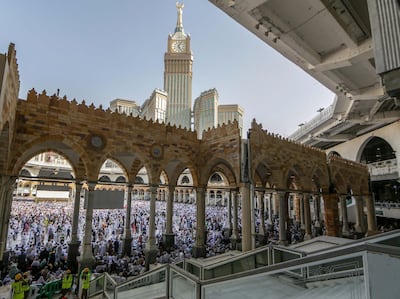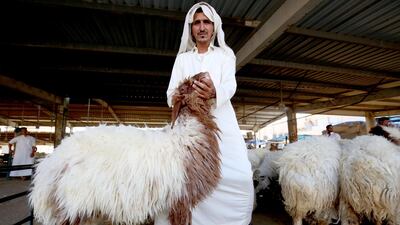Over the next few days, Muslim pilgrims in Makkah will be completing the final stage of Hajj, which culminates with Eid Al Adha, a three-day festival during which Muslims traditionally slaughter an animal. The ritual is inspired by the story of the Prophet Ibrahim, whom God asked to sacrifice what he loved most, as an act of obedience: his son. Ibrahim obeyed wearing a blindfold but when he uncovered his eyes, he discovered a sheep had been sacrificed instead of his own child.
Along with the deep religiosity and symbolism of the sacrificial act, it has charitable purposes too. The meat is distributed equally between immediate family members, then friends and relatives, with the remaining third going to the poor. Some people choose to make a donation towards a sacrifice in poorer countries or communities.
A growing number of Muslims, however, have been embracing a vegan Eid in recent years. At a time when animal welfare and the impact of meat consumption on climate change have become hot topics, it is no surprise the global community is talking about these important subjects.
For some Muslims, however, the Eid sacrifice is an integral part of their faith. Even if most of them do not physically take part in the ritual, they pay a fee to charities that perform it on their behalf.

It raises the age-old debate of custom versus obligation. Scholars are divided on which governs the practice of the sacrifice today. Those who argue it is obligatory say while giving meat seems at odds with current mores, it has a meaning that transcends our present.
Many advocates of a vegan Eid point to the fact that Islam is a faith that urges compassion and kindness to all living beings, including animals. They suggest alternatives such as plant-based foods. Others say the principles of intention and giving charity to those who need it is sufficient, and that sacrificing an animal is not required, especially because there are no guarantees that the creature will be treated in the way true halal meat requires.
Opponents to the idea of a meat-free Eid say the rules about halal meat are very strict on prohibiting animal cruelty: for example, an animal cannot even be present if another is being slaughtered.
Unfortunately, practices across the modern industrialised global meat industry – Muslim or otherwise – are unlikely to treat animals in this way.
I have sympathy for both arguments and welcome the fact it is pushing us to debate significant problems which need urgent attention. Animal welfare is at the heart of this. The other is the total amount of meat eaten throughout the year in more affluent regions, where meat consumption is a common occurrence, at a time when many nutritionists argue that we need to cut back.
For me, what is missing is a discussion about the relationship between donor and recipient. Is it our right, as a pampered elite who can afford to choose our next meal, to decide whether or not to deprive a poor community of meat that they might not otherwise be able to enjoy?
The contribution of the meat industry to climate change is being driven by richer countries where we consume more meat, even though we don’t need it. Yet we are denying meat to people in poverty. If Eid Al Adha is about sacrifice, then who in this scenario is actually sacrificing something?
For many people, the idea of a vegan Eid is an oxymoron – derisory and an affront to a long-held religious act. But we shouldn’t take it as either. Instead, we should hold it up as a mirror so we can be honest about the challenges facing us: better care for animals, better care for the environment but above all, more effective care for the people in the world who need it most, but have the least.
Shelina Janmohamed is the author of Love in a Headscarf and Generation M: Young Muslims Changing the World


